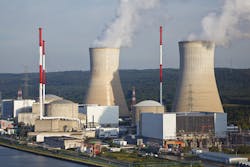Japan Restarts 1st Nuclear Reactor Since Fukushima Accident
Japan restarted its first nuclear reactor this week since the Fukushima Daiichi nuclear accident in March 2011.
The Sendai Unit 1 nuclear reactor is the first of more than 40 operable Japanese nuclear reactors that are expected to start coming back online over the coming months and years. Kyushu Electric Power Company told CNN the plant’s second reactor could be restarted as soon as October.
Another 20 reactors are in various stages of the restart process, according to the Nuclear Energy Institute. Prior to restart, the Nuclear Regulatory Authority requires NRA certification to verify the reactors meet upgraded safety standards put in place after the Fukushima Daiichi accident. Japan’s government plans to bring the share of nuclear generation to 20-22 percent by 2030, according to NEI.
Japan’s fleet of nuclear plants was progressively idled following the Fukushima accident when an earthquake triggered a tsunami that sent water crashing into the plant causing a meltdown. Although the accident has not led to measurable radiation health impacts, according to the World Nuclear Association, it has resulted in a long-term public evacuation, heightened public fears, and new safety requirements for Japan’s remaining nuclear facilities.
READ ALSO: LNG Surges on Energy Demands in Asia-Pacific
"This is a hugely important step, which sets the country firmly on the path to restoring its trade balance and regaining energy independence, as well as reducing emissions," said Agneta Rising, Director General of the World Nuclear Association, in response to the restart of the Sendai Unit 1. "The process of regaining public trust takes a big step forward today. It is completely understandable that people’s faith in nuclear technology was shaken by the events of 11 March 2011, but now the Japanese people need to see their reactors performing efficiently and reliably with operators fully committed to protecting public health and the environment. It is important that they are reminded of the key role nuclear energy has traditionally played in supporting industry, keeping bills down, and keeping Japan secure."
Before the Fukushima disaster, about 30 percent of Japan’s energy was nuclear-generated. While Japan’s prime minister supports a restart of Japan’s nuclear energy program to lower dependence on expensive imports of natural gas and coal, public opinion polls have consistently shown opposition to a nuclear restart, according to a CNN report.
But leaders like Rising said the restart of Sendai Unit 1 puts Japan on the road to recovery. "Going forward, it is essential that the nuclear industry works harder at building better relationships with the public as well as improving our performance and future technology offerings," he said.


